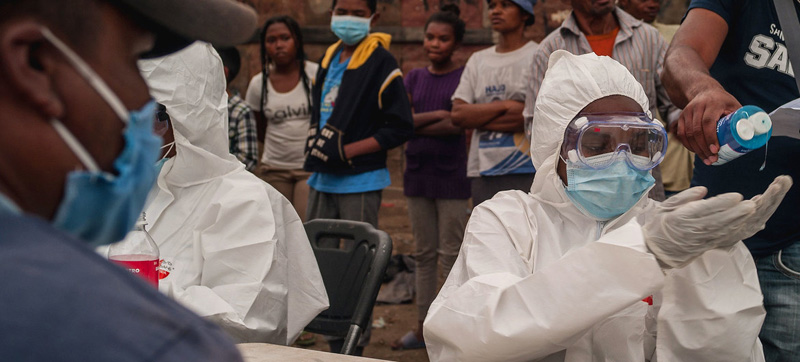 COVID19
COVID19 Prioritize health workers, at-risk groups, for COVID-19 vaccines: WHO chief
New York: As countries plan to roll out COVID-19 vaccines in the coming days, weeks and months, health workers and other at-risk populations should be prioritized for vaccination, the head of the World Health Organization (WHO) said on Monday.
“People at highest risk of serious disease or death as a result of age, are also a high priority group because protecting them will reduce severe disease and death and take the burden off health systems”, said Tedros Adhanom Ghebreyesus, the WHO Director-General, speaking in Geneva.
“As supply increases, the next groups would include those who have higher risk of severe disease because of their underlying conditions, and marginalized groups at higher risk.”
Roadmap for rollout
The recommendations are based on the so-called Values Framework and Population Prioritization Roadmap, issued by a WHO advisory group on immunization.
“In the initial stages of rollout, with only a small proportion of a country’s population immunized, it’s vital that governments, communities and individuals continue using proven public health tools”, Tedros added.
He said WHO continues to work to better understand how many people on the planet have been exposed to the virus, and how long immunity lasts in those who have been infected.
Hundreds of seroprevalence studies conducted worldwide reveal most of the global population remains susceptible to infection.
Seroprevalence studies look for antibodies in the blood and help in understanding how long immunity from natural infection lasts, said Tedros, which could inform understanding of vaccination immunity.
Countering vaccine hesitancy
Meanwhile, accurate information about COVID-19 vaccines is vital to improving public knowledge and trust in these treatments as they come on stream, another senior WHO official said, responding to a journalist’s question about vaccine hesitancy.
“I think this assessment that people will make about their understanding of the benefits of the vaccine is going to be a critical next phase in the pathway towards having these vaccines be critical tools in the toolbox of the interventions that we have”, said Dr. Katherine O’Brien, Director of the Department of Immunization, Vaccines and Biologicals.
Trusted sources, accurate information
WHO wants the public to be informed about the science behind vaccines, she said, adding trusted sources are also important for communities and individuals making decisions on being vaccinated.
“So, information really does need to come from the most local level possible: from trusted providers, from people’s physicians, or the nurse that they go to, or the voice of public health people in the community”, said Dr. O’Brien.
Dr. O’Brien reported that a “very robust” safety monitoring system is in place as countries begin the rollout of several COVID-19 vaccines which have come through the trial stage. “So sharing the information and the transparency that we have through the regulatory process and through the policy recommending process, is really important so that there is accuracy in what people understand about the vaccines.”
“That safety system is switched on fully for full coordination across all the different groups – the regulators, the manufacturers, WHO – to be looking at the data in real time, so that if there any signals of concern around the vaccine, we have the ability to look at that, to investigate it and to really understand if there is any issue,” she said.
Support Our Journalism
We cannot do without you.. your contribution supports unbiased journalism
IBNS is not driven by any ism- not wokeism, not racism, not skewed secularism, not hyper right-wing or left liberal ideals, nor by any hardline religious beliefs or hyper nationalism. We want to serve you good old objective news, as they are. We do not judge or preach. We let people decide for themselves. We only try to present factual and well-sourced news.







